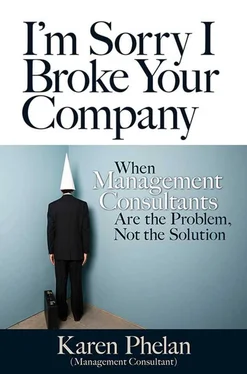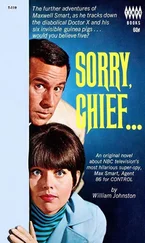Karen Phelan - I'm Sorry I broke Your Company
Здесь есть возможность читать онлайн «Karen Phelan - I'm Sorry I broke Your Company» весь текст электронной книги совершенно бесплатно (целиком полную версию без сокращений). В некоторых случаях можно слушать аудио, скачать через торрент в формате fb2 и присутствует краткое содержание. Город: San Francisco, Год выпуска: 2013, ISBN: 2013, Издательство: Berrett-Koehler Publishers, Жанр: management, popular_business, на английском языке. Описание произведения, (предисловие) а так же отзывы посетителей доступны на портале библиотеки ЛибКат.
- Название:I'm Sorry I broke Your Company
- Автор:
- Издательство:Berrett-Koehler Publishers
- Жанр:
- Год:2013
- Город:San Francisco
- ISBN:978-1-60994-740-8; 978-1-60994-741-5
- Рейтинг книги:3 / 5. Голосов: 1
-
Избранное:Добавить в избранное
- Отзывы:
-
Ваша оценка:
- 60
- 1
- 2
- 3
- 4
- 5
I'm Sorry I broke Your Company: краткое содержание, описание и аннотация
Предлагаем к чтению аннотацию, описание, краткое содержание или предисловие (зависит от того, что написал сам автор книги «I'm Sorry I broke Your Company»). Если вы не нашли необходимую информацию о книге — напишите в комментариях, мы постараемся отыскать её.
I'm Sorry I broke Your Company — читать онлайн бесплатно полную книгу (весь текст) целиком
Ниже представлен текст книги, разбитый по страницам. Система сохранения места последней прочитанной страницы, позволяет с удобством читать онлайн бесплатно книгу «I'm Sorry I broke Your Company», без необходимости каждый раз заново искать на чём Вы остановились. Поставьте закладку, и сможете в любой момент перейти на страницу, на которой закончили чтение.
Интервал:
Закладка:
If these brilliant, Harvard-educated guys cant predict the future very well, how can the rest of us expect to do so?
If you pick up any decade-old business book that uses company examples to illustrate It's points, at least half of those companies will no longer be performing well. GE was used as a benchmark for companies in the 1990s, and lots of It's practices were imitated. Today, few would copy a GE practice. Even Jack Welch himself has backpedaled on the importance of shareholder value. If you are looking for a company to emulate, Google and Apple are the likely choices.
The problem with executing strategic plans is that they are predicated on your ability to predict economic conditions, industry changes, competitor actions, and customer desires. However, no one can do this with any kind of reliability. This is why financial experts recommend investing in index funds. The majority of mutual fund managers cannot outperform the indexes they are trying to beat, and they have tons of research and researchers at their disposal. They come from all the best schools. Yet they cannot predict the future performance of stocks with any reliability or accuracy. Of all the world-class economists whose jobs are to predict the future, almost no one saw the financial crisis of 2008 coming. Yet it is a business best practice to try to predict the future and enact a plan around that future vision. This is what companies are supposed to do to succeed.
After Gemini had become successful at process reengineering, It's leadership team decided that Gemini needed a strategy to take us to the next level. A small team of leaders decided that our future was «business transformation,» and Gemini would own this term and offer all It's services under this brand. This approach would tackle business strategy, business processes, information technology (IT), and organizational design in one fell swoop, completely remaking a company. Although that sounds altruistic, it was really consultant-speak for extra big cost-cutting projects. Except for desperate companies, who else would want a complete makeover? The business transformation strategy was communicated to all employees, and managers were told to sell work that fit the transformation tenets. Although we had some huge transformation engagements at the time, our bread and butter — as is the case generally for consultants — was a steady stream of small projects. We were no longer going to pursue these.
Unfortunately for us, but fortunately for the rest of the world, the economy picked up, companies were no longer desperate to downsize. No one was interested in buying business transformation because it is essentially a disruptive, costly, and painful process. Although our leadership eventually realized this folly, we had become a company associated with massive downsizing. Whenever «Gemini» was mentioned in a competitive bid, the client’s employees trembled. Companies were tired of downsizing. This new thing called the Internet and It's associate, e-commerce, about which we knew nothing, were all the rage. Gemini started cutting It's own heads, something it knew how to do well. All our best consultants started to leave for competitors, and Gemini dissipated within a few short years. It is now a small organizational development group within Cap Gemini Ernst & Young and has a few small offices outside the United States. This outcome was particularly ironic as transforming companies through strategy development and process reengineering was our business, and we had the best tools and smartest people at our disposal.
A few years later, after I had left the chaos of the consulting world for a more stable corporate job, I lived through a similar experience with Pfizer. Under Hank McKinnell, Pfizer’s strategy was to use It's massive sales force (almost twice as large as the nearest competitor’s) to create blockbuster drugs. In the early 2000s, Pfizer had an impressive array of multibillion-dollar drugs and more in the pipeline. It had turned Lipitor into the bestselling drug in history, had created a whole new market with Viagra, and was buying Pharmacia to exploit Celebrex in the same way. At the time, Pfizer wouldn't even consider developing a drug that didn't have a potential market value of $1 billion. Also in this time frame, Pfizer began to shed It's nonpharma-ceutical businesses because it wanted to focus on It's core business of proprietary pharmaceuticals, and these side businesses were diluting It's earnings per share. Pharmaceutical companies have traditionally diversified to mitigate the risks of drug development. Pharmaceuticals may have high profit margins, but the chances of developing a useful and popular drug, never mind a blockbuster, are pretty slim. Needless to say, over the next few years, Pfizer’s pipeline of potential blockbusters, Celebrex, Bextra, torcetrapib, Exubera, Chantix, and Rezulin, went bust. The Pfizer stock price declined from forty-two dollars to seventeen dollars during this time (before the market crash of 2008), and the company chewed through both Hank McKinnell and his handpicked successor, Jeff Kindler, in five years.
I have worked for only four companies in my career, and this is what happened to three of them. (I left the fourth after a poorly managed acquisition — so poor that the corporate leadership needed to testify before Congress.) These anecdotes about strategies going awry are not the exception. This is how strategy is done. If you look at them from a textbook perspective, Gemini and Pfizer did many things right. From the core competence perspective, they both built upon their own unique capabilities. At Gemini, it was process reengineering and results delivery capabilities. At Pfizer, it was It's sales juggernaut. They also anticipated the future and conceived an innovative strategy that would shape the marketplace. From a Porter perspective, they pursued a differentiation strategy that would result in a significant competitive advantage. Gemini would own the business transformation consulting market, and Pfizer would turn drugs into blockbuster drugs. Best yet, aligning with the Jack Welch and Boston Consulting Group tenets, these strategies would lead to unbridled growth and market leadership. Plus, they were based on past successes in the marketplace. The strategies themselves passed these textbook tests, and even better, the companies also executed the strategies well.
If you look at these strategies from a laypersons perspective, rather than a strategy analysts, you’re likely to say, «What were they thinking?» In the consulting world, the Holy Grail is big projects at Fortune 500 clients. This is the consulting equivalent of premium products with repeat buyers — a highly profitable business model with low conversion costs. This is the strategy both DHS&S and Gemini were pursuing and the place where most consulting firms want to be. The problem with targeting Fortune 500 clients is that there aren’t thousands of them. There are only 500. And there are only so many big projects a company of any size wants to take on. Getting a big project at a big client is a little like winning the lottery. In comparison, Pfizer’s strategy of developing only blockbuster drugs is a lot like the strategy of trying to win the lottery by buying only winning tickets. Of course, every pharma company wants blockbuster drugs. It’s just that drug development is a very risky business, and most of the promising molecules won’t result in any drug at all.
What would lead smart companies like Pfizer and Gemini to create untenable strategies? Let’s review the typical process for strategy development. First, it is a given that corporate success is predicated on a leader developing a corporate vision of the future, which by definition is predicting the future. The way to develop the future vision is to hire consultants who do lots of research on the industry and trends and write all this up in a report. Next, the consultants bring a small group of the leadership team together to brainstorm an overall vision and strategic goals based on their findings. In the strategy world, «big, hairy, audacious goals» (per Jim Collins), like «being number one or two,» «new market creation,» and «continuous double digit growth,» are encouraged. If you are going to dream, you might as well dream big! Once that vision is created, the leader needs to persuade the rest of the organization to believe the vision, and then management ensures that the organization takes only those actions that would lead to the creation of that vision. Businesses need to focus their resources and therefore cant expend resources on anything other than achieving the strategy.
Читать дальшеИнтервал:
Закладка:
Похожие книги на «I'm Sorry I broke Your Company»
Представляем Вашему вниманию похожие книги на «I'm Sorry I broke Your Company» списком для выбора. Мы отобрали схожую по названию и смыслу литературу в надежде предоставить читателям больше вариантов отыскать новые, интересные, ещё непрочитанные произведения.
Обсуждение, отзывы о книге «I'm Sorry I broke Your Company» и просто собственные мнения читателей. Оставьте ваши комментарии, напишите, что Вы думаете о произведении, его смысле или главных героях. Укажите что конкретно понравилось, а что нет, и почему Вы так считаете.












